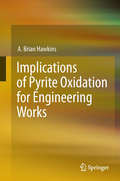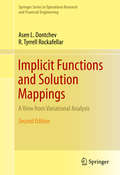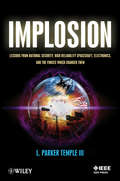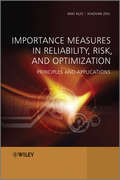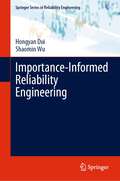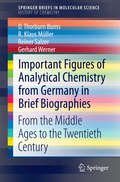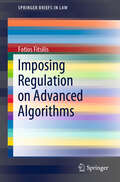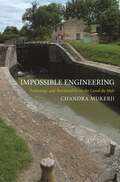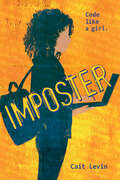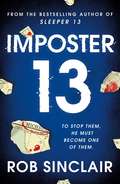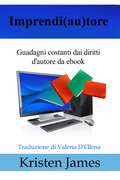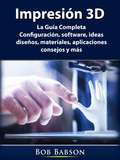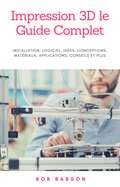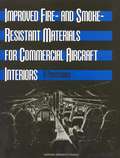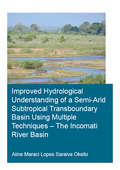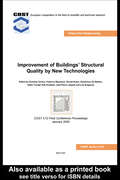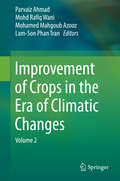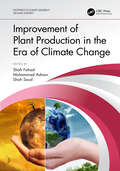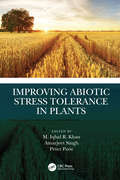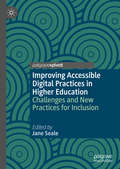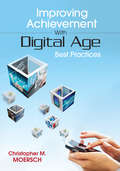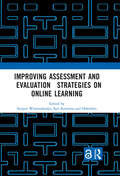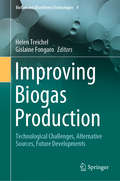- Table View
- List View
Implications of Pyrite Oxidation for Engineering Works
by A. Brian HawkinsThe book highlights and analyses the distress to buildings caused by sulphate-induced heave, with particular reference to the recent problems in the Dublin area of Ireland. It describes the formation of pyrite, the processes involved in its oxidation and the various ways in which consequential expansion takes place. For the first time in the literature it discusses the way that buildings can be raised above their supporting foundation walls by the expansion of pyritiferous fill which has been used beneath ground-bearing floor slabs in Ireland. The significance of fractures through the iron sulphide microcrystals for the rate and extent of oxidation is discussed. Photographs and profiles of sulphate ingress into concrete/concrete blocks are presented. Case histories from the UK, North America and Ireland are discussed.
Implicit Functions and Solution Mappings
by R. Tyrrell Rockafellar Assen L. DontchevThe implicit function theorem is one of the most important theorems in analysis and its many variants are basic tools in partial differential equations and numerical analysis. This book treats the implicit function paradigm in the classical framework and beyond, focusing largely on properties of solution mappings of variational problems. The purpose of this self-contained work is to provide a reference on the topic and to provide a unified collection of a number of results which are currently scattered throughout the literature. The first chapter of the book treats the classical implicit function theorem in a way that will be useful for students and teachers of undergraduate calculus. The remaining part becomes gradually more advanced, and considers implicit mappings defined by relations other than equations, e.g., variational problems. Applications to numerical analysis and optimization are also provided. This valuable book is a major achievement and is sure to become a standard reference on the topic.
Implosion: Lessons from National Security, High Reliability Spacecraft, Electronics, and the Forces Which Changed Them
by L. Parker TempleImplosion is a focused study of the history and uses of high-reliability, solid-state electronics, military standards, and space systems that support our national security and defense. This book is unique in combining the interdependent evolution of and interrelationships among military standards, solid-state electronics, and very high-reliability space systems. Starting with a brief description of the physics that enabled the development of the first transistor, Implosion covers the need for standardizing military electronics, which began during World War II and continues today. The book shows how these twin topics affected, and largely enabled, the highest reliability and most technologically capable robotic systems ever conceived. This riveting history helps readers: Realize the complex interdependence of solid-state electronics and practical implementations in the national security and defense space programs Understand the evolution of military standards for piece parts, quality, and reliability as they affected these programs Gain insight into the attempted reforms of federal systems acquisition of security- and defense-related space systems in the latter half of the twentieth century Appreciate the complexity of science and technology public policy decisions in the context of political, organizational, and economic realities Written in clear, jargon-free language, but with plenty of technical detail, Implosion is a must-read for aerospace and aviation engineers, manufacturers, and enthusiasts; technology students and historians; and anyone interested in the history of technology, military technology, and the space program.
Importance Measures in Reliability, Risk, and Optimization
by Xiaoyan Zhu Way KuoThis unique treatment systematically interprets a spectrum of importance measures to provide a comprehensive overview of their applications in the areas of reliability, network, risk, mathematical programming, and optimization. Investigating the precise relationships among various importance measures, it describes how they are modelled and combined with other design tools to allow users to solve readily many real-world, large-scale decision-making problems. Presenting the state-of-the-art in network analysis, multistate systems, and application in modern systems, this book offers a clear and complete introduction to the topic. Through describing the reliability importance and the fundamentals, it covers advanced topics such as signature of coherent systems, multi-linear functions, and new interpretation of the mathematical programming problems.Key highlights:Generalizes the concepts behind importance measures (such as sensitivity and perturbation analysis, uncertainty analysis, mathematical programming, network designs), enabling readers to address large-scale problems within various fields effectivelyCovers a large range of importance measures, including those in binary coherent systems, binary monotone systems, multistate systems, continuum systems, repairable systems, as well as importance measures of pairs and groups of componentsDemonstrates numerical and practical applications of importance measures and the related methodologies, including risk analysis in nuclear power plants, cloud computing, software reliability and moreProvides thorough comparisons, examples and case studies on relations of different importance measures, with conclusive results based on the authors' own researchDescribes reliability design such as redundancy allocation, system upgrading and component assignment.This book will benefit researchers and practitioners interested in systems design, reliability, risk and optimization, statistics, maintenance, prognostics and operations. Readers can develop feasible approaches to solving various open-ended problems in their research and practical work. Software developers, IT analysts and reliability and safety engineers in nuclear, telecommunications, offshore and civil industries will also find the book useful.
Importance-Informed Reliability Engineering (Springer Series in Reliability Engineering)
by Hongyan Dui Shaomin WuThis book provides university students and practitioners with a collection of importance measures to design systems with high reliability, maintain them with high availability, and restore them in case of failures. Optimal reliability design, properly system maintenance and resilience management are vital for retaining a high level of system availability. Reliability importance measures, which are used to identify the weakest components from different perspectives, can be used to achieve this goal. The book has seven parts. Chapter 1 introduces the basic concepts. Chapter 2 focuses on importance measures for the system design phase and introduces how the system reliability can be improved with importance measures. Chapters 3 and 4 provide importance measures-related methods for scheduling maintenance policies under different scenarios. Chapter 5 provides importance measures for networks. Chapter 6 proposes importance measures for resilience management. The last chapter, or Chapter 7, illustrates the importance measures with case studies adopted from four types of systems: mechanical systems, energy systems, transport networks, and supply chain networks.
Important Figures of Analytical Chemistry from Germany in Brief Biographies
by Reiner Salzer D. Thorburn Burns R. Klaus Müller Gerhard WernerMore than 80 personalities, in or from Germany, that over the centuries have shaped the development of analytical chemistry are introduced by brief biographies. These accounts go beyond summarising key biographical information and outline the individual's contributions to analytical chemistry. This richly illustrated Brief offers a unique resource of information that is not available elsewhere.
Imposing Regulation on Advanced Algorithms (SpringerBriefs in Law)
by Fotios FitsilisThis book discusses the necessity and perhaps urgency for the regulation of algorithms on which new technologies rely; technologies that have the potential to re-shape human societies. From commerce and farming to medical care and education, it is difficult to find any aspect of our lives that will not be affected by these emerging technologies. At the same time, artificial intelligence, deep learning, machine learning, cognitive computing, blockchain, virtual reality and augmented reality, belong to the fields most likely to affect law and, in particular, administrative law. The book examines universally applicable patterns in administrative decisions and judicial rulings. First, similarities and divergence in behavior among the different cases are identified by analyzing parameters ranging from geographical location and administrative decisions to judicial reasoning and legal basis. As it turns out, in several of the cases presented, sources of general law, such as competition or labor law, are invoked as a legal basis, due to the lack of current specialized legislation. This book also investigates the role and significance of national and indeed supranational regulatory bodies for advanced algorithms and considers ENISA, an EU agency that focuses on network and information security, as an interesting candidate for a European regulator of advanced algorithms. Lastly, it discusses the involvement of representative institutions in algorithmic regulation.
Impossible Engineering: Technology and Territoriality on the Canal du Midi (Princeton Studies in Cultural Sociology)
by Chandra MukerjiThe Canal du Midi, which threads through southwestern France and links the Atlantic to the Mediterranean, was an astonishing feat of seventeenth-century engineering--in fact, it was technically impossible according to the standards of its day. Impossible Engineering takes an insightful and entertaining look at the mystery of its success as well as the canal's surprising political significance. The waterway was a marvel that connected modern state power to human control of nature just as surely as it linked the ocean to the sea. The Canal du Midi is typically characterized as the achievement of Pierre-Paul Riquet, a tax farmer and entrepreneur for the canal. Yet Chandra Mukerji argues that it was a product of collective intelligence, depending on peasant women and artisans--unrecognized heirs to Roman traditions of engineering--who came to labor on the waterway in collaboration with military and academic supervisors. Ironically, while Louis XIV and his treasury minister Jean-Baptiste Colbert used propaganda to present France as a new Rome, the Canal du Midi was being constructed with unrecognized classical methods. Still, the result was politically potent. As Mukerji shows, the project took land and power from local nobles, using water itself as a silent agent of the state to disrupt traditions of local life that had served regional elites.Impossible Engineering opens a surprising window into the world of seventeenth-century France and illuminates a singular work of engineering undertaken to empower the state through technical conquest of nature.
Impossible d’être fauché si vous avez un smartphone: Comment transformer votre téléphone en source de revenus
by Dave McAllenArrêtez d’entraver votre réussite financière. Vous ne pouvez être fauché si vous possédez un smartphone. En ce qui concerne l’argent, le revenu, les privilèges, les parcours et compétences individuelles, ou le chômage, un nombre sans cesse croissant de gens se retrouvent à rejeter la faute, ou à l’avoir fait récemment, au gouvernement ou à la conjoncture. Nonobstant cette exacerbation sans précédent, l’action protestataire définie comme revendication inexprimée ou juste moyen d’attirer l’attention, relève de raisonnements absurdes datant du siècle dernier, en plus d’être une stratégie dépassée. Cette remise en cause, tant de l’action protestataire que de ses auteurs par Dave McAllen, offre une perspective nouvelle, radicale et révolutionnaire, en faisant valoir que la pleurnicherie au sujet de votre sort n’a pas droit de cité à notre ère numérique, tout le monde étant en possession d’un smartphone. Il offre ici quelques exemples d’activités rentables faisables depuis votre smartphone et montre comment cette façon de voir les choses est l’antidote qui vous fera arrêter d’entraver votre réussite financière. Alors, apprenez ce qui fait de vous l’entrave à votre réussite.
Imposter
by Cait LevinHigh-school sophomore Cam feels she must prove herself in her computer science class and RoboSub team in this realistic and empowering, witty young adult STEM read.An inspiring debut that takes on self-discovery and gender discrimination in the engineering and coding fields, perfect for 12+ year olds.High school sophomore Cam has always created techie things, like a ring she implanted with an NFC chip. This semester, she finally gets the chance to take a computer science elective. Cam tries to ignore the obnoxious boys who don't believe she should be in the class at all.Cam conspires with her quick-witted best friend, Viv, and they engineer their way onto the extracurricular RoboSub team. That ultimately lands them at a national competition as the only two girls on their team. Will Cam rise to the occasion and confirm—not to others, but to herself—that she belongs? Readers will be pulled into this realistic and rousing YA STEM coming-of-age book that&’s sure to inspire girls in science to pursue classes, careers, and spaces that others believe they should have no part in."[Imposter is] a celebration of everything we aim to foster through our programs—curiosity, creativity, collaboration, and the courage to dream big." —Alicia Gavin, Director of Communications and Marketing at RoboNation
Imposter 13: The breath-taking, must-read bestseller!
by Rob SinclairTHE EXPLOSIVE FINALE TO THE SLEEPER 13 SERIESAgainst all odds, Aydin Torkal - aka Sleeper 13 - broke free from the terrorist group that took him as a child and raised him into a life of violence and hate.In the two years since, he's been tracking and killing those responsible. But he's not done yet.Now living a secret life in London, MI6 needs his help infiltrating a sinister new terrorist cell. In order to halt their deadly ambitions, he must convince the world's most dangerous terrorists that he's one of them.He must do it before the world suffers another deadly attack.And he must do it alone.He is IMPOSTER 13.THE SLEEPER 13 THRILLER SERIES HAS READERS GRIPPED:'Perfect for spy thriller lovers and fans of I Am Pilgrim, Orphan X' - Goodreads review'I could not put down this book' - Netgalley reviewer'Brilliant, gripping' - Netgalley reviewer
Imposter 13: The breath-taking, must-read bestseller! (Sleeper 13 #3)
by Rob SinclairTHE EXPLOSIVE FINALE TO THE SLEEPER 13 SERIESAgainst all odds, Aydin Torkal - aka Sleeper 13 - broke free from the terrorist group that took him as a child and raised him into a life of violence and hate.In the two years since, he's been tracking and killing those responsible. But he's not done yet.Now living a secret life in London, MI6 needs his help infiltrating a sinister new terrorist cell. In order to halt their deadly ambitions, he must convince the world's most dangerous terrorists that he's one of them.He must do it before the world suffers another deadly attack.And he must do it alone.He is IMPOSTER 13.THE SLEEPER 13 THRILLER SERIES HAS READERS GRIPPED:'Perfect for spy thriller lovers and fans of I Am Pilgrim, Orphan X' - Goodreads review'I could not put down this book' - Netgalley reviewer'Brilliant, gripping' - Netgalley reviewer
Imprendi(Au)Tore: Guadagni Costanti Dai Diritti D'autore Da Ebook
by Kristen James Valeria D'EllenaImprendiautore: un nome. Un autore/imprenditore professionista che lotta per migliorare in tutte le aree del business della pubblicazione: scrittura, pubblicazione e marketing Cosa ci vuole per farcela come autore? Quali sono i costi reali di produzione e pubblicità? Sono molti gli scrittori che fanno soldi pubblicando ebook, e quanto guadagnano? "Imprendi(au)tore" fornisce uno scorcio di ciò che è implicato nella pubblicazione indipendente e di cosa potete aspettarvi in diverse fasi della vostra carriera come: Muovere i primi passi nel mondo della pubblicazione di ebook Autore con molti libri Guadagnare 500 al mese o più E persino sentirsi bloccati nella scrittura e nel marketing Io parlo di numeri reali e di ciò che significa la parola "successo" per persone diverse: non si tratta solo di soldi. Questo libro è per gli scrittori che danno valore alla narrazione e all'empatia con i lettori, e con chi vuole sviluppare una carriera, non ottenere vendite alte per un mese. "Imprendi(au)tore" è pieno di suggerimenti che potete utillizzare nell'organizzazione, nello smuovere le vendite e tutte le strategie che ho usato per vendere più libri, raddoppiare le mie vendite ogni anno e triplicare le mie entrate. Pieno di link e risorse aggiuntive!
Impresión 3D: La Guía Completa: Configuración, software, ideas, diseños, materiales, aplicaciones, consejos y más
by Bob BabsonImpresión 3D La Guía Completa: Configuración, software, ideas, diseños, materiales, aplicaciones, consejos y más por Bob Babson En este libro aprenderá todo sobre la impresión en 3D y cómo empezar. Impresión 3D de la guía completa: configuración, software, ideas, diseños, materiales, aplicaciones, consejos y más ¿Le gustaría comprar una impresora 3D pero no tiene ni idea de cuál comprar? ¿Le gustaría aprender a utilizar las impresoras 3D para imprimir objetos y diseños sorprendentes? En este libro aprenderá todo sobre la impresión en 3D y cómo empezar. Aprende: -Cómo empezar -Qué impresoras 3D comprar -Características y capacidades de las impresoras 3D + MUCHO MÁS! Descargo de responsabilidad: Este autor y/o propietario(s) de derechos no hace reclamos, promesas o garantías sobre la exactitud, integridad o adecuación de los contenidos de este libro, y expresamente niega responsabilidad por errores y omisiones en los contenidos dentro de este libro. Este producto es sólo para uso de referencia.
Impression 3D le Guide Complet: Installation, logiciel, idées, conceptions, matériaux, applications, conseils et plus
by Bob BabsonDans ce livre, vous apprendrez tout sur l'impression 3D et son fonctionnement. Impression 3D, le guide complet : Installation, logiciel, idées, conceptions, matériaux, applications, conseils et plus Vous souhaitez acheter une imprimante 3D mais vous ne savez pas laquelle ? Vous voulez apprendre à utiliser des imprimantes 3D pour imprimer des objets et des dessins époustoufflants ? Dans ce livre, vous apprendrez tout sur l'impression 3D et la bonne méthode pour commencer. Découvrez : -Comment débuter -Quelles imprimantes 3D acheter -Les caractéristiques et capacités des imprimantes 3D + BIEN PLUS ENCORE ! Avis de non-responsabilité : L'auteur et/ou le(s) propriétaire(s) des droits ne font aucune réclamation, promesse ou garantie quant à l'exactitude, l'exhaustivité ou la pertinence du contenu de cet ouvrage, et déclinent expressément toute responsabilité pour les erreurs et omissions dans le contenu de ce dernier. Ce produit est uniquement destiné à être utilisé à titre de référence.
Improved Fire- and Smoke- Resistant Materials for Commercial Aircraft Interiors: A Proceedings
by Committee on Fire- Smoke-Resistant Materials for Commercial Aircraft InteriorsThis book describes the Conference on Fire and Smoke-Resistant Materials held at the National Academy of Sciences on November 8-10, 1994. The purpose of this conference was to identify trends in aircraft fire safety and promising research directions for the Federal Aviation Administration's program in smoke and fire resistant materials. This proceedings contains 15 papers presented by distinguished speakers and summaries of the workshop sessions concerning toxicity issues, fire performance parameters, drivers for materials development, and new materials technology.
Improved Hydrological Understanding of a Semi-Arid Subtropical Transboundary Basin Using Multiple Techniques - The Incomati River Basin (IHE Delft PhD Thesis Series)
by Saraiva OkelloThis study aims at improving the hydrological process understanding of the semi-arid and transboundary Incomati river basin to enable better water management. Comprehensive statistical and trend analysis of rainfall and streamflow were conducted, and the Indicators of Hydrological Alteration tool was deployed to describe the streamflow regime and trends over time. Land use and land cover change, particularly the conversion of natural vegetation into forest plantation, the expansion of irrigated agriculture and the flow regulation due to dam operation were identified as critical drivers of flow regime alteration. Hydrograph separation using long-term hydrochemical data at seasonal scale, and hydrochemical and isotope data at event scale were performed to quantify runoff components. A novel methodology to calibrate recursive digital filters using routinely collected water quality data was developed and tested in the catchment. This method allows for estimation of daily baseflow from readily available daily streamflow data. Dominant runoff generation zones were mapped using the Height Above Nearest Drainage approach. The hydrological model STREAM was then employed, informed by the runoff generation zones mapping and the process understanding gained in the catchment, as well as remote sensing data. The study provides the basis for better operational water management in the catchment.
Improvement of Buildings' Structural Quality by New Technologies: Proceedings of the Final Conference of COST Action C12, 20-22 January 2005, Innsbruck, Austria
by Jean-Pierre Jaspart Federico Mazzolani Christian Schaur Gerald Huber Heiko Trumpf Heli Koukkari Luis BragançaLaunched in May 2000, the aims of the COST C12 cooperative action were:to develop, combine and disseminate new technical engineering technologiesto improve the quality of urban buildingsto propose new technical solutions to architects and plannersto reduce the disturbance caused by construction in urban areas and improve urban quality of life.This
Improvement of Crops in the Era of Climatic Changes
by Parvaiz Ahmad Mohamed Mahgoub Azooz Lam-Son Phan Tran Mohd Rafiq WaniCurrent trends in population growth hint that global food production is unlikely to gratify future demands under predicted climate change scenarios unless the rates of crop improvement are accelerated. Crop production faces numerous challenges, due to changing environmental conditions and evolving needs for new plant-derived materials. These challenges come at a time when the plant sciences are witnessing remarkable progress in understanding fundamental processes of plant growth and development. Drought, heat, cold and salinity are among the major abiotic stresses that often cause a series of morphological, physiological, biochemical and molecular alterations which adversely affect plant growth, development and productivity, consequently posing a serious challenge for sustainable food production in large parts of the world, particularly in emerging countries. This emphasizes the urgency of finding better ways to translate new advances in plant science into concrete successes in agricultural production. To overcome the pessimistic influence of abiotic stresses and to maintain the food security in the face of these challenges, new, improved and tolerant crop varieties, contemporary breeding techniques, and cavernous understanding of the mechanisms that counteract detrimental climate changes are indubitably needed to sustain the requisite food supply. In this context, Improvement of Crops in the Era of Climatic Changes, Volume 1provides a state-of-the-art guide to recent developments that aid in the understanding of plant responses to abiotic stresses and lead to new horizons vis-à-vis prime strategies for translating current research into applied solutions to create strong yields and overall crop improvement under such unfavourable environments. Written by a diverse group of internationally famed scholars, Improvement of Crops in the Era of Climatic Changes, Volume 1 is a brief yet all-inclusive resource that is immensely advantageous for researchers, students, environmentalists, soil scientists, professionals, and many others in the quest of advancement in this flourishing field of research.
Improvement of Plant Production in the Era of Climate Change (Footprints of Climate Variability on Plant Diversity)
by Shah Fahad Muhammad Adnan Shah SaudCurrent trends in population growth suggest that global food production is unlikely to meet future demands under projected climate change scenarios unless the pace of plant improvement is accelerated. Plant production is facing many challenges due to changing environmental conditions and the growing demand for new plant-derived materials. These challenges come at a time when plant science is making significant progress in understanding the basic processes of plant growth and development. Major abiotic stresses like drought, heat, cold and salinity often cause a range of morphological, physiological, biochemical, and molecular changes affecting plant growth, development, and productivity; so sustainable food production poses a serious challenge to much of the world, particularly in emerging countries. This underscores the urgent need to find better ways to translate new advances in plant science into concrete successes in agricultural production. In order to overcome the negative effects of abiotic stress and to maintain food security in the face of these challenges, new, improved, and resilient plant varieties, contemporary breeding techniques, and a deep understanding of the mechanisms for offsetting harmful climate change are undoubtedly necessary. In this context, Improvement of Plant Production in the Era of Climate Change is a guide to the most advanced techniques that help in understanding plant response to abiotic stress, leading to new horizons and the strategy for the current translation studies application to overall solution to create a powerful production and crop improvement in such an adverse environment. FEATURES • Provides a state-of-the-art description of the physiological, biochemical, and molecular-level understanding of abiotic stress in plants. • Courses taught in universities from basics to advanced level in field of plant physiology, molecular genetics, and bioinformatics will use this book. • Focuses on climatic extremes and their management for plant protection and production, which is great threat to future generation and food security. • Understanding of new techniques pointed out in this book will open the possibility of genetic engineering in crop plants with the concomitant improved stress tolerance. • Addressing factors that are threatening future food production and providing potential solutions to these factors. • Written by a diverse group of internationally famed scholars, this book adds new horizons in the field of abiotic stress tolerance.
Improving Abiotic Stress Tolerance in Plants
by M. Iqbal Khan Amarjeet Singh Péter PoórAbiotic stresses such as drought, flooding, high or low temperatures, metal toxicity and salinity can hamper plant growth and development. Improving Abiotic Stress Tolerance in Plants explains the physiological and molecular mechanisms plants naturally exhibit to withstand abiotic stresses and outlines the potential approaches to enhance plant abiotic stress tolerance to extreme conditions. Synthesising developments in plant stress biology, the book offers strategies that can be used in breeding, genomic, molecular, physiological and biotechnological approaches that hold the potential to develop resilient plants and improve crop productivity worldwide. Features · Comprehensively explains molecular and physiological mechanism of multiple abiotic stress tolerance in plants · Discusses recent advancements in crop abiotic stress tolerance mechanism and highlights strategies to develop abiotic stress tolerant genotypes for sustainability · Stimulates synthesis of information for plant stress biology for biotechnological applications · Presents essential information for large scale breeding and agricultural biotechnological programs for crop improvement Written by a team of expert scientists, this book benefits researchers in the field of plant stress biology and is essential reading for graduate students and researchers generating stress tolerant crops through genetic engineering and plant breeding. It appeals to individuals developing sustainable agriculture through physiological and biotechnological applications.
Improving Accessible Digital Practices in Higher Education: Challenges and New Practices for Inclusion
by Jane SealeThis book examines the role played by technologies in removing the disadvantage experienced by students with disabilities in higher education. Addressing five key themes, the editor and contributors explore the practices required of stakeholders within higher education institutions to mediate successful and supportive relationships between disabled learners and their technologies. Ultimately, the book argues that practice in the fields of disability, ICT and higher education is still not providing consistent and widespread positive learning experiences to students with disabilities. In order to address this situation, the field needs to creatively integrate knowledge gained through both research and practice, and to re-imagine what is needed for ICT to meaningfully contribute to a reduction in disadvantage for disabled students. This book will be of interest and value to scholars of disability studies, education and accessibility, and educational technologies.
Improving Achievement With Digital Age Best Practices
by Christopher M. MoerschConnect Common Core, inquiry, and technology! While technology ushers in exciting and innovative educational opportunities, finding best practices for complete integration remains a challenge. In this practical resource, educators will discover a roadmap for implementing digital age best practices. With discussions on how to promote networked collaboration, bolster purposeful inquiry, and anchor student decision-making and learning with digital-age tools, these research-based strategies deliver: A user-friendly road map for digital transition into new Common Core Standards Lesson plans, benchmarks, and instructional units to bridge the link between 21st century skills, Common Core Standards, and student achievement Practical tips for classroom, building, and district implementation Tools and guidance for successful PLCs
Improving Assessment and Evaluation Strategies on Online Learning: Proceedings of the 5th International Conference on Learning Innovation (ICLI 2021), Malang, Indonesia, 29 July 2021
by Surjani WonorahardjoICLI is an annual International Conference on Learning Innovation (ICLI) hosted byUniversitas Negeri Malang, Indonesia in collaboration with the Islamic Development Bank (IsDB) and Indonesian Consortium for Learning Innovation Research (ICLIR) as well as Univerisiti Teknologi MARA Cawangan Perlis, Malaysia serving as co-organizer this year. The conference aims to gather researchers, practitioners, students, experts, consultants, teachers and lecturers to share their insights and experiences on research not only in constructing innovations in learning but also the knowledge of learner’s capability. The learners who are characterized as creative and competent by having the ability to understand what they have learned and capable of taking initiative and thinking critically. In addition, ICLI is organized on the basis of the trend in the 21st century, categorized by the increasing complexity of technology and the emergence of a corporate restructuring movement. This book is the proceeding of ICLI 2021, containing a selection of articles presented at this conference as the output of the activity. Various topics around education are covered in this book and some literature studies around specific topics on learning and education are covered as well. This proceeding book will be beneficial to students, scholars, and practitioners who have a deep concern in education. It is also futuristic with a lot of practical insights for students, faculty, and practitioners, and also a description of the Indonesian educational system in today’s era.
Improving Biogas Production: Technological Challenges, Alternative Sources, Future Developments (Biofuel and Biorefinery Technologies #9)
by Helen Treichel Gislaine FongaroThis book highlights the current limitations of biogas production and yield and new avenues to improving them. Biogas production and yield are among the most important renewable energy targets for our world. Pursuing an innovative and biotechnological approach, the book presents alternative sources for biogas production and explores a broad range of aspects, including: pre-treatment of substrates, accelerators (enzyme-mediated) and inhibitors involved in the process of obtaining biogas and its yield, design specifications for digesters/modified digesters, managing biogas plants, microbial risk and slurry management, energy balance and positive climatic impacts of the biogas production chain, and the impacts on Human, Animal and Environmental Health (“One Health” concept for the biogas chain).
